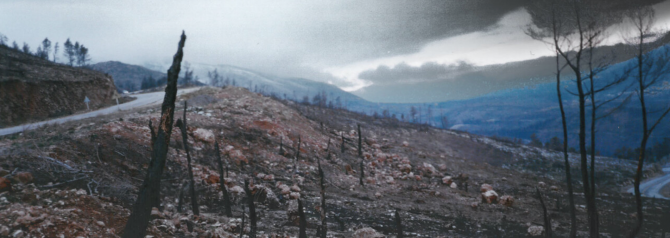
Kalavryta
By Lasse-Marc Riek and Constantin Gröhn
Speakers: Rolf Becker, Laura Cisneros, Julia Kümmel, Nikos Ritsikalis, Sabine Waffender, Sylvia Wempner
Teenagers: Emil Görtz, Lucia Grope, Jorina Happke, Anna von Hippel, Simon Jungnickel, Pascal Laakmann, Ntiimi Mwakalambo, Jana Winneg
Host: Landeszentrale für politische Bildung Hamburg
Length: 33'45
The radio play Kalavryta focuses on a massacre, disguised as a "campaign of revenge," carried out by the German Wehrmacht in the area of Kalavryta, a small Greek town in the northern Peloponnese, in 1943. Hundreds of civilians, aged 14 and older, were murdered. In October 1943, around 80 German soldiers were captured near Kalavryta and later executed. In retaliation, the 117th Jäger Division initiated what it called "the harshest atonement measures," targeting the local civilian population. As a result, Kalavryta, along with 22 other villages and three monasteries, was destroyed. Among the losses was the Hellenic national shrine of Agia Lavra, where the Greek War of Independence against the Ottoman Empire had been proclaimed in 1821. According to Wehrmacht records, 676 civilians were executed. The looting and destruction that followed led to widespread disease and famine, leaving scars that remain visible to this day. These events were the catalyst for a trip in 2017 by a group of young people from Hamburg, whose experiences and reflections, including confronting certain clichés, are woven into the radio play. Through soundscapes and various eyewitness accounts, the play recalls the events of World War II. The narrative framework is provided by Franzeska Nika, who survived the massacre and poetically conveys her memories in the play.
Kalavryta represents the atrocities committed by the Nazis during "reprisal actions" across Europe, particularly in Eastern and Southeastern Europe, and serves as an example of the brutal methods employed under Nazi occupation.
Supported by the Förderverein St. Johannis-Harvestehude, the Kirchliche Gedenkstättenarbeit Neuengamme | Ev.-Luth. Kirchenkreis Hamburg-Ost, and the St. Nikolai Memorial in Hamburg.
Acknowledgements and Recognition
The project group extends its gratitude to the Federal Ministry for Family Affairs, Senior Citizens, Women, and Youth, as well as the Förderverein St. Johannis-Harvestehude, for funding their stay in Greece from 17–21 October 2017.
Special thanks for the open conversations and discussions during the stay go to: Jesuit priest Prof. Michalis Roussos, historian Prof. Dr. Hagen Fleischer, Monika Frank from the German Embassy in Athens, the chairman of the Kalavryta Association in Athens Sotiris Tsenes, the mayor of Kalavryta Giorgos Lazouras, the survivors of the massacre in Kalavryta, including Roji Nikos Koliopoulos, Christos Antonopoulous, and Michalis Grintzas, the Abbot of the Agia Lavra Monastery Mr. Evsebios, the Deputy Abbot of the Mega Spileon Monastery Mr. Kalinikos, the chairman of the Kalavryta Cultural Association Alexis Lechouritis, and the chairman of the Kalavryta Holocaust Museum Christos Fotinopoulos.
We also thank all additional speakers from the live performances: Felicia Bandilla, Elisabeth Fussell, Ava Gebhardt, Suleiman Hussein, Felix Marx, Albert Koch, Sarah Laakmann, Magdalena Rahtgens, Oscar Rehders, Lasse Stiefel, Marlene Schellong, and Simon Luthe.
Our deepest respect goes to Ehrengard Schramm, née von Thadden, who traveled to Greece and Kalavryta as a historian as early as 1952, despite the refusal of the German legation in Athens to provide information on the events. With the support of the German Women's Association, she later founded an aid organization and brought 70 young people from Kalavryta to Germany for training.
The participants of the 2017 youth exchange in Kalavryta fondly remember Alice Jenckel for her cheerful and energetic spirit. Sadly, she passed away in an accident shortly after returning from Greece.
Project Site via Landeszentrale für politische Bildung Hamburg (German)



